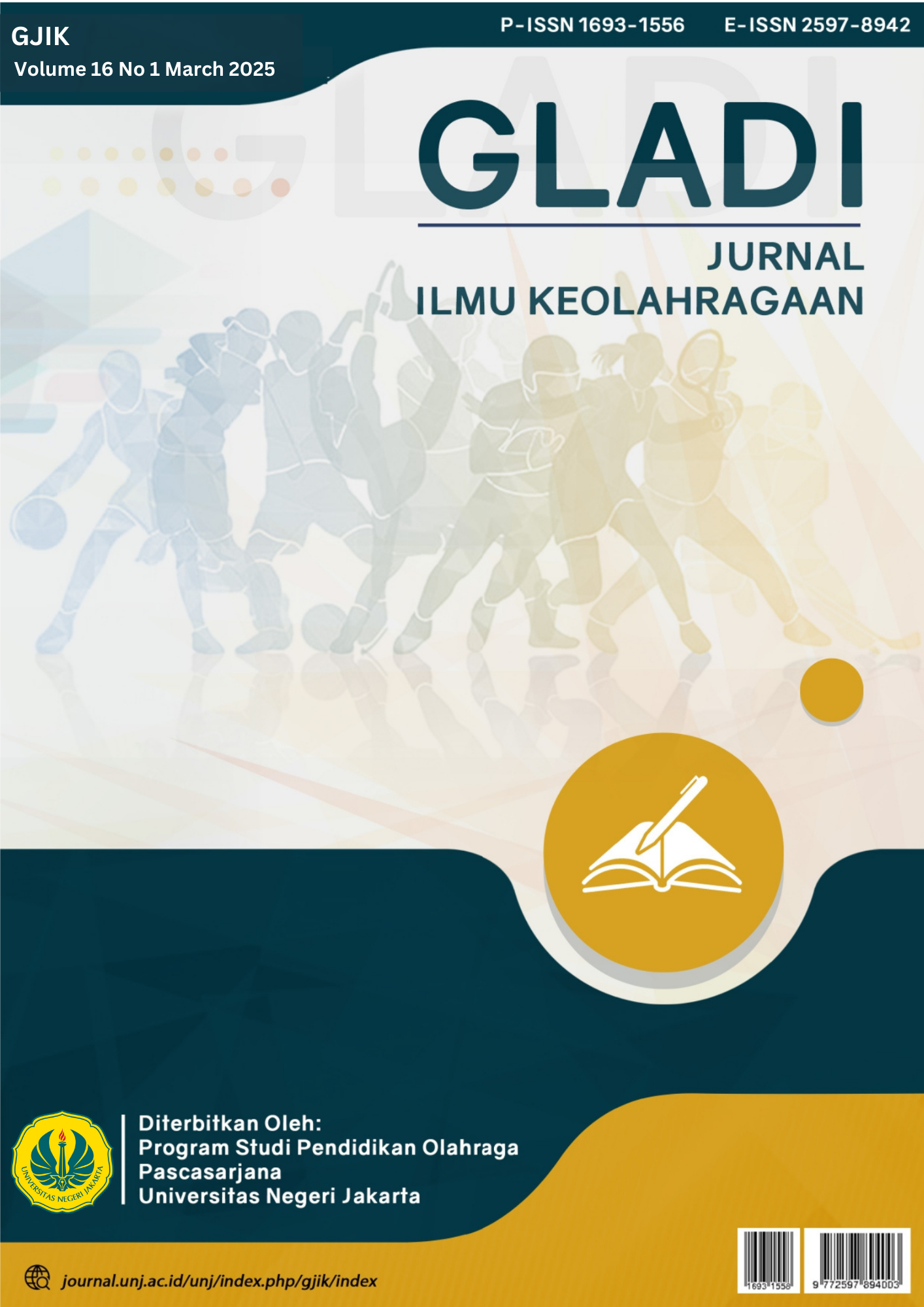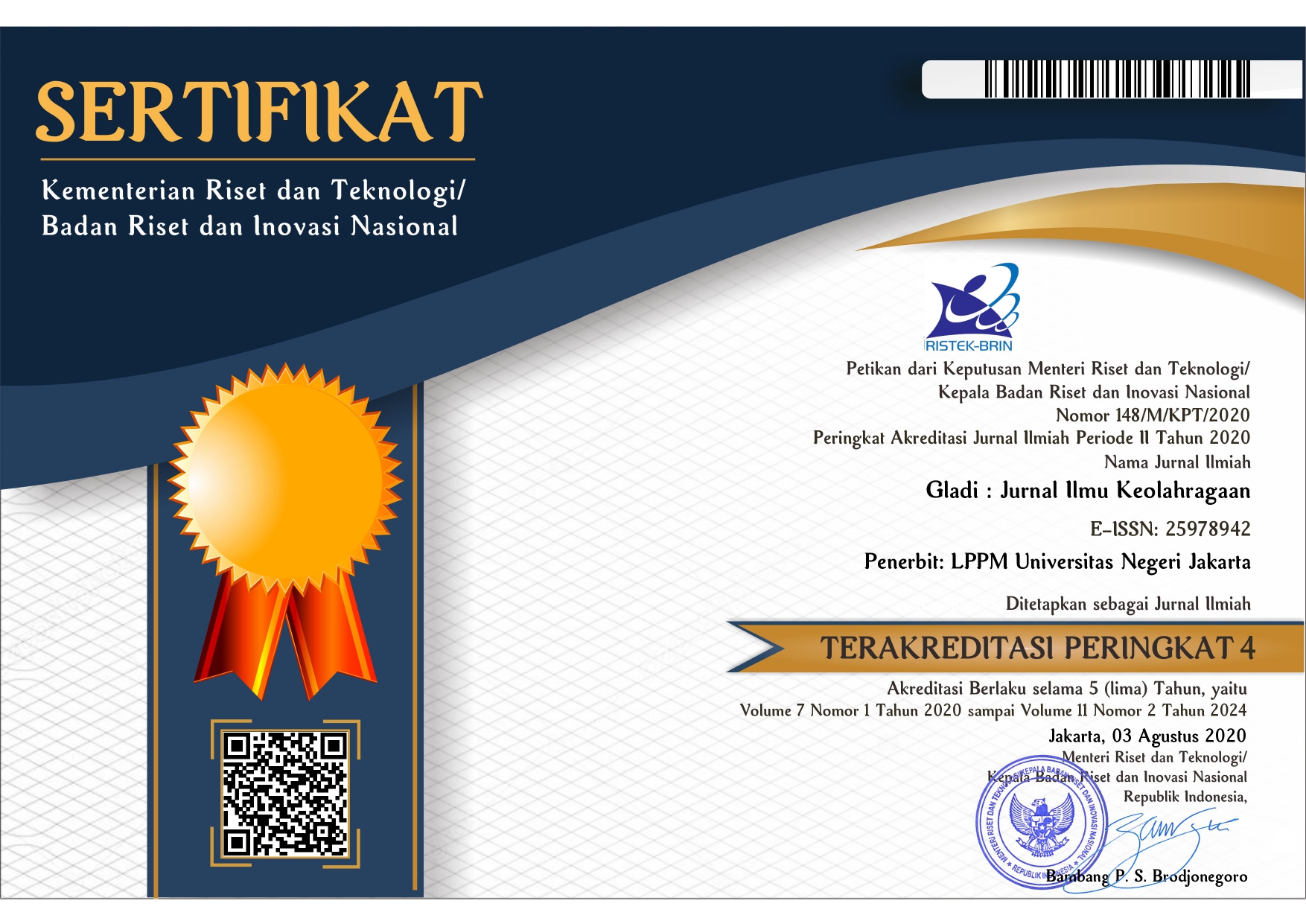A QUALITATIVE EXPLORATION OF INDIVIDUAL MOTIVATION FOR INTERMITTENT FASTING SUPPORTED BY EXERCISE USING SELF-DETERMINATION THEORY
DOI:
https://doi.org/10.21009/GJIK.161.02Keywords:
Intermittent Fasting, Self-Determination Theory, Motivation Categories, Weight Management, Physical Activity, Social SupportAbstract
Obesity remains a global health issue with significant physical, social, and psychological impacts. One increasingly popular approach to managing obesity is the Intermittent Fasting (IF) diet. This study aims to examine the motivation and effectiveness of IF among fitness center members who also engage in regular exercise. Using the Self-Determination Theory (SDT) framework, this research explores internal and external factors influencing participants' commitment to IF.This qualitative descriptive study employed semi-structured interviews conducted at Idachi Fitness Metro Indah Mall. Thematic analysis following Braun and Clarke’s six-phase process was used to identify key themes. The findings revealed five categories of motivation: intrinsic regulation, identified regulation, introjected regulation, external regulation, and amotivation. Participants highlighted the benefits of IF, such as weight management, increased energy, and improved sleep quality. These findings underscore the importance of combining IF with exercise for achieving optimal health outcomes. Additionally, external motivations, such as social support and encouragement from trainers, often developed into intrinsic motivations as participants experienced health improvements. Further research is recommended to explore the long-term effects of combining IF and exercise on health and motivation.
Downloads
References
Adi Supraba, P. A., Sutadarma, I. W. G., & Wiryanthini, I. A. D. (2020). Pengaruh puasa berselang terhadap berat badan pada mahasiswa Program Studi Pendidikan Dokter Fakultas Kedokteran Universitas Udayana. Intisari Sains Medis, 11(3), 955–957. https://doi.org/10.15562/ism.v11i3.173
Afriani, Y., Sari, S. P., Puspaningtyas, D. E., & Anwar, F. (2023). Pendampingan Pengaturan Menu Gizi Seimbang Atlet Sepak Bola Junior pada Pelatih di SSB Baturetno. E-Dimas: Jurnal Pengabdian Kepada Masyarakat, 14(3), 616–623. https://doi.org/10.26877/e-dimas.v14i3.15297
Akbar Maulidini, D., & Aidha, Z. (2020). Perilaku penerapan gizi seimbang masyarakat kota Binjai pada masa pandemi covid-19 Tahun 2020. Jurnal Menara Medika, 3(1), 15–21.
Braun, V., & Clarke, V. (2023). Toward good practice in thematic analysis: Avoiding common problems and be(com)ing a knowing researcher. International Journal of Transgender Health, 24(1), 1–6. https://doi.org/10.1080/26895269.2022.2129597
Cade, J., & O’Connell, S. (1991). Management of weight problems and obesity: Knowledge, attitudes and current practice of general practitioners. British Journal of General Practice, 41(345), 147–150.
Clifton, K. K., Ma, C. X., Fontana, L., & Peterson, L. L. (2021). Intermittent fasting in the prevention and treatment of cancer. CA: A Cancer Journal for Clinicians, 71(6), 527–546. https://doi.org/10.3322/caac.21694
Ermona, N. D. N., & Wirjatmadi, B. (2018). Hubungan Aktivitas Fisik Dan Asupan Gizi Dengan Status Gizi Lebih Pada Anak Usia Sekolah Dasar Di Sdn Ketabang 1 Kota Surabaya Tahun 2017. Amerta Nutrition, 2(1), 97. https://doi.org/10.20473/amnt.v2i1.2018.97-105
Fairuz, R. A., Absari, N. W., Utami, R. F., & Djunet, N. A. (2024). Pengaruh Diet Puasa (Intermittent Fasting) Terhadap Penurunan Berat Badan, Perubahan Metabolik, Dan Massa Otot. Healthy Tadulako Journal (Jurnal Kesehatan Tadulako), 10(1), 40–47. https://doi.org/10.22487/htj.v10i1.975
Favieri, F., Forte, G., & Casagrande, M. (2019). The executive functions in overweight and obesity: A systematic review of neuropsychological cross-sectional and longitudinal studies. Frontiers in Psychology, 10(SEP). https://doi.org/10.3389/fpsyg.2019.02126
Ganesan, K., Habboush, Y., & Sultan, S. (2018). Intermittent Fasting: The Choice for a Healthier Lifestyle. Cureus, 10(7). https://doi.org/10.7759/cureus.2947
Hamzah, I. F. (2020). Aplikasi Self-Determinantion Theory pada Kebijakan Publik Era Industri 4.0. Psisula: Prosiding Berkala Psikologi, 1(September), 66–73. https://doi.org/10.30659/psisula.v1i0.7691
Harahap, H., Herlambang, H., & Putra, I. P. (2023). Pengaruh Intermittent Fasting terhadap Berat Badan dan Kadar Hifile:///C:/Users/Hp 14s/Downloads/Article+0201-159-171.pdfgh Density Lipoprotein pada Individu dengan Overweight. Journal Of Medical Studies, 3, 168–176.
Harahap, H., Kusdiyah, E., Usni, M., Hasibuan, Z., Harahap, A. H., Yosephine, M., & Malau, R. (2021). Efek Intermittent Fasting Tipe 5:2 Terhadap Asam Urat dan Lingkar Pinggang Individu Dengan Overweight dan Obesitas. Jambi Medical Journal Jurnal Kedokteran Dan Kesehatan ·, 000, 409–417. https://www.researchgate.net/publication/363890119
Karri, S., Sharma, S., Hatware, K., & Patil, K. (2019). Natural anti-obesity agents and their therapeutic role in management of obesity: A future trend perspective. Biomedicine and Pharmacotherapy, 110(November 2018), 224–238. https://doi.org/10.1016/j.biopha.2018.11.076
Kim, J. Y. (2021). Optimal diet strategies for weight loss and weight loss maintenance. Journal of Obesity and Metabolic Syndrome, 30(1), 20–31. https://doi.org/10.7570/JOMES20065
Malinowski, B., Zalewska, K., Węsierska, A., Sokołowska, M. M., Socha, M., Liczner, G., Pawlak-Osińska, K., & Wiciński, M. (2019). Intermittent fasting in cardiovascular disorders—an overview. Nutrients, 11(3). https://doi.org/10.3390/nu11030673
Morais, A. H. D. A., Passos, T. S., Vale, S. H. D. L., Maia, J. K. D. S., & Maciel, B. L. L. (2021). Obesity and the increased risk for COVID-19: Mechanisms and nutritional management. Nutrition Research Reviews, 34(2), 209–221. https://doi.org/10.1017/S095442242000027X
Murta, L., Seixas, D., Harada, L., Damiano, R. F., & Zanetti, M. (2023). Intermittent Fasting as a Potential Therapeutic Instrument for Major Depression Disorder: A Systematic Review of Clinical and Preclinical Studies. International Journal of Molecular Sciences, 24(21). https://doi.org/10.3390/ijms242115551
Patterson, R. E., & Sears, D. D. (2017). Efek Metabolisme Puasa Intermiten. 371–393.
Peng, W., Zhang, J., Zhou, H., Zhang, A., Wang, Y., Tian, X., Wen, D., & Wang, Y. (2022). Obesity intervention efforts in China and the 2022 World Obesity Day. Global Health Journal, 6(3), 118–121. https://doi.org/10.1016/j.glohj.2022.07.007
Rathomi, H. S., Mavaddat, N., Katzenellenbogen, J. M., & Thompson, S. C. (2025). “It just made sense to me!” A Qualitative Exploration of Individual Motivation for Time-Restricted Eating. Appetite, 204(June 2024), 107751. https://doi.org/10.1016/j.appet.2024.107751
Reynolds, P. (2019). Effect of Intermittent Fasting in Patients with Type 2 Diabetes. https://commons.und.edu/nurs-capstones
Safaei, M., Sundararajan, E. A., Driss, M., Boulila, W., & Shapi’i, A. (2021). A systematic literature review on obesity: Understanding the causes & consequences of obesity and reviewing various machine learning approaches used to predict obesity. Computers in Biology and Medicine, 136(April), 104754. https://doi.org/10.1016/j.compbiomed.2021.104754
Strauss, A. (2021). Obesity in pregnant women: maternal, fetal, and transgenerational consequences. European Journal of Clinical Nutrition, 75(12), 1681–1683. https://doi.org/10.1038/s41430-021-01015-z
Stubbs, J., Whybrow, S., Teixeira, P., Blundell, J., Lawton, C., Westenhoefer, J., Engel, D., Shepherd, R., Mcconnon, Á., Gilbert, P., & Raats, M. (2011). Problems in identifying predictors and correlates of weight loss and maintenance: Implications for weight control therapies based on behaviour change. Obesity Reviews, 12(9), 688–708. https://doi.org/10.1111/j.1467-789X.2011.00883.x
Susanne Garverich, Christopher G. Prener, Margaret E. Guyer, A. K. L. (2021). Akses Publik HHS Naskah. 21287(7), 1–16. https://doi.org/10.1016/j.jand.2015.02.018.PUASA
Ting, R., Dugré, N., Michael, P. G., Ccfp, A., Lindblad, A. J., & Pharmd, A. (2018). Machine Translated by Google ALAT UNTUK PRAKTIK Diet ketogenik untuk menurunkan berat badan. 64, 2018.
Verstuyf, J., Patrick, H., Vansteenkiste, M., & Teixeira, P. J. (2012). Motivational dynamics of eating regulation: A self-determination theory perspective. International Journal of Behavioral Nutrition and Physical Activity, 9(1), 21. https://doi.org/10.1186/1479-5868-9-21
Vogel, C., Zwolinsky, S., Griffiths, C., Hobbs, M., Henderson, E., & Wilkins, E. (2019). A Delphi study to build consensus on the definition and use of big data in obesity research. International Journal of Obesity, 43(12), 2573–2586. https://doi.org/10.1038/s41366-018-0313-9
Zubrzycki, A., Cierpka-Kmiec, K., Kmiec, Z., & Wronska, A. (2018). The role of low-calorie diets and intermittent fasting in the treatment of obesity and type-2 diabetes. Journal of Physiology and Pharmacology, 69(5), 663–683. https://doi.org/10.26402/jpp.2018.5.02
Downloads
Published
How to Cite
Issue
Section
License
Copyright (c) 2025 Ghaitsa Zahira Shofa Fadlilah, Yati Ruhayati, Jajat Jajat, Kuston Sultoni, Adang Suherman

This work is licensed under a Creative Commons Attribution-ShareAlike 4.0 International License.







